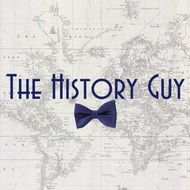
Join The History Guy from YouTube in conversation about his videos and various topics in history. Here you can find behind-the-scenes peeks of the set and The History Cats. Share ideas for future videos or ask questions of both the community and The History Guy himself. Early releases and the occasional extras are available for supporting members.
On December 10, 1906 the president of the United States was awarded the Nobel Prize prize for peace. It was a controversial award. The award represents the unique time in history, the complex legacy of the nations twenty-sixth president, and the persistent disagreement over an award for peace given in a world where reality makes peace uncommon at best.
The road to plentiful aluminum was long, and literally dozens of important scientists were involved over a period of centuries in the effort to purify the metal. In the end, the solution would come almost simultaneously from two scientists, each just 22 years of age.
While little known in the US today, In the early 1900s, a Basque sport that had been played for centuries seemed poised to enter America’s mainstream.
On February 27, 1942 a three decades old US Navy ship was attacked by Japanese aircraft and sunk. It was a difficult time for the allies, many ships were lost that day. But the sinking of USS Langley represented the end of one of the most consequential ships is the Navy's history.












